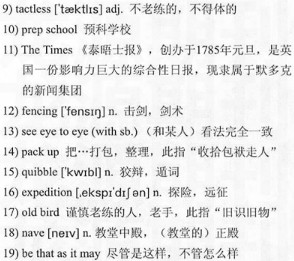本文是一幕短剧,父亲Stanley是一位家具厂的设计员,儿子Clive则是刚入剑桥不久的大学新鲜人。这天,儿子假期归来,父子二人有了以下一番对话。两代人之间不同的观念和思维方式的碰撞让两人的对话不免带点“火药味”,不过父亲的“威严”对儿子颇有些震慑力,于是儿子“消极应对”,结果一场矛盾冲突并未爆发,而两人最后的对话却有些耐人寻味……
文字难度:★★☆
Stanley: (Carefully) Clive, do you remember coming to the factory for your 1)allowance the day you went up to Cambridge? Did you have a talk to my manager while you were waiting?
 Clive: Yes, I do... I suppose I did.
Clive: Yes, I do... I suppose I did.
Stanley: Is it true you told him you thought the furniture we make was “2)shoddy and 3)vulgar”? (Pause) Well?
Clive: I think I said it—it lacked... Well, that it didn’t use materials as well as it might. Wood, for example. (He smiles hopefully.)
Stanley: And the design was shoddy and vulgar?
Clive: Well, yes, I suppose I gave that impression. Not all of it, of course—just some things...
Stanley: What things?
Clive: ( 4)Plucking up a little courage) Well, those terrible oak cupboards, for example. And those 5)three-piece 6)suites in 7)mauve 8)plush. Things like that...
Stanley: And I suppose you think that’s clever. That’s being educated, I suppose, to go up to my manager in my own factory and tell him you think the stuff I’m turning out is shoddy and vulgar... Is it?
Clive: (Rises, crosses to the bookshelf for a book, and takes it to a chair at the dining-table) I am sorry I said that about the furniture. I suppose it was 9)tactless of me…
Stanley: Never mind. How are you settling down at Cambridge? What about the other boys, do you get on with them?
Clive: It’s not exactly like 10)prep school, you know. You rather pick your own friends.
Stanley: Yes, I suppose you do. Well, what do they do there? I mean apart from lessons.
Clive: Anything you like. There are all sorts of clubs and societies.
Stanley: Do you belong to any?
Clive: Yes, I joined a Dramatic Society as a matter of fact.
Stanley: You mean for acting?
Clive: It’s quite professional, you know. They have their own theatre and get reviews in 11)The Times.
Stanley: Don’t any of your friends play games?
Clive: Yes, but—the cricket and football are sort of professional standards. I thought of taking up 12)fencing; it’s not as odd as it sounds. It’s meant to be very good for coordination.
Stanley: What’s that?
Clive: Muscles, I think.
Stanley: Clive, as you know, your mother and I didn’t 13)see eye to eye about sending you to university. But that’s past history now. The point is, what use are you going to make of it? Well?
Clive: That’s rather as it turns out, I should have thought. I mean you can’t judge things in advance, can you?
Stanley: Ah now, that’s just what I mean. If you don’t know where you’re going you might just as well 14)pack up.
Clive: Why?
Stanley: It’s quite simple, I should have thought.
Clive: It isn’t. It just isn’t like that. I mean if I knew where I was going I wouldn’t have to go there, would I? I’d be there already.
Stanley: What kind of silly 15)quibble is that?
Clive: It’s not quibble. Look, education—being educated—you just can’t talk about it in that way. It’s something quite different—like setting off on an 16)expedition into the jungle. Gradually all the things you know disappear. The 17)old birds fly out of the sky, new ones fly in you’ve never seen before, and everything surprises you. Trees you expected to be a few feet high grow right up overhead, like the 18)nave of Wells Cathedral. Anyway, if you had seen all this before, you would not have to go looking. I think education is simply the process of being taken by surprise, do you see?
Stanley: 19)Be that as it may…
Clive: You don’t see.
Stanley: (Rises and crosses to above dining-table) Clive, I’m not talking about education. By all means, take advantage of your lessons. Look here boy, let’s not pretend. Everyone doesn’t get to Cambridge, you know it and I know it. You’re in a privileged position, and you must make the most of it. What you do now will influence the rest of your life. You know that, don’t you?
Clive: Yes, I suppose it will.
Stanley: Take your friends for example. What kind of friends do you have?
Clive: Do you want a list?
Stanley: Now don’t start getting on any 20)high horse. I’m simply saying this... (sits above the dining-table and leans towards Clive) People still judge a man by the company he keeps. You go around with a lot of21)drifters and arty boys, and you’ll be judged as one of them.
Clive: I don’t...
Stanley: (Cuts him off immediately and closes his book) I don’t say you do, and you’re old enough to decide for yourself anyway. Right? (Clive nods.) Now’s the time for you to be making contacts with the right people, I mean people who will be useful to you later on. I don’t mean the smart people or the fancy 22)la-de-da people your mother’s always on about. I mean the people that matter—the people who will have influence. Get in with them now and you won’t go far wrong. I never had your opportunities, the contacts I made I had to 23)work up myself. Do you understand?
Clive: Yes, I do.
Stanley: (Rises and turns to Clive) Would you like to walk with me over to Benton’s?
Clive: I—I’ve got some reading to do actually.
Stanley: We can stop in at the Red Lion for 24)a quick one.
Clive: No. I don’t think so really.
Stanley: Very well.
斯坦利:(认真地)克利夫,你还记得你去剑桥大学那天到我工厂拿零用钱的事吗?你在那儿等的空当,有跟我们经理谈话吗?
克利夫:是的,我记得……呃,我想是的。
斯坦利:你跟他说你觉得我们制造的家具“劣质又俗气”,是真的吗?(停了一下)是吗?
克利夫:我想我是这样说的——它们缺少……呃,那些设计并没有充分利用那些材料,比如说,木头。(他满怀希望地微笑。)
斯坦利:它们的设计劣质又俗气?
克利夫:呃,是的,我想我说了那种感觉。当然,并不是全部——只是有一些是……
斯坦利:哪些?
克利夫:(鼓起一些勇气)嗯,比如说那些糟糕的橡木碗柜。还有那些套上紫红色毛绒的三件套。诸如此类……
斯坦利:我想你以为那样做很聪明。那就是受过教育高人一等了,跑到我的工厂里找到我的经理,告诉他,你认为我设计的家具劣质又俗气……是吗?
克利夫:(起身,走到书架前,拿出一本书,坐在餐桌边的一把椅子上)我为自己就那些家具说的话而道歉。看来,我是有些鲁莽……
斯坦利:没关系。你在剑桥过得怎么样?和其他人相处得好吗?
克利夫:大学和预科学校不尽相同,你知道。你会有选择性地交朋友。
斯坦利:当然,我想你在这方面不会有问题。那么,你们平时都干些什么?我是说课余时间。
克利夫:任何我想做的事。那儿有各种各样的俱乐部和社团。
斯坦利:你有参加什么社团吗?
克利夫:有,事实上我参加了一个戏剧协会。
斯坦利:你是说表演吗?
克利夫:你知道吗,他们相当专业。他们有自己的剧场,《泰晤士报》也登过他们的剧评。
斯坦利:你的朋友们没有参加什么体育活动吗?
克利夫:有啊!不过——板球和足球是那种专业要求水平很高的。我想参加击剑,这运动并不像它听起来那样古怪,对提高协调能力非常好。
斯坦利:你指的是?
克利夫:肌肉,我想。
斯坦利:克利夫,你知道,我和你妈妈对你上大学的意见并不一致。但现在那已是过去的事了。现在的重点是你要如何利用这个机会。对吧?
克利夫:我想那得看情况如何。我是说,你不能就还未发生的事情作出判断,对吧?
斯坦利:啊,那就是我现在想说的。如果你不知道自己在往哪里走,你还不如收拾包袱走人!
克利夫:为什么?
斯坦利:很简单,我早该想到。
克利夫:不是那样的,不可能是那样的。我的意思是,如果我知道自己的路向的话,我就不会去那儿读书了,是吧?要是那样的话,我早该在那个目的地了。
斯坦利:这是什么傻话狡辩啊?
克利夫:这不是狡辩。教育——被教育——你不能那样去谈论。它不像你所想的那样,而是像一次丛林探险。渐渐地,你所熟知的事物都消失了。旧识旧物会飞离天际,从未见过的新事物会飞入视野,一切都让你惊奇不已。你原以为只有几英尺高的树木会长成参天大树,像韦尔斯大教堂中殿那么高。不管怎样,如果之前你已经见识过所有这些了,你就没有必要去看了。我认为,教育简单来说就是一个让人不断发现并惊奇不已的过程。你明白我说的吗?
斯坦利:不管怎么样……
克利夫:你并不明白。
斯坦利:(起身,走到餐桌前方)克利夫,我不是在谈教育。无论如何,你都得从你的课程中学到点什么。听我说,孩子,我们都清楚:不是所有人都能去剑桥,这点我们都知道。你身处那么一个优越的位置,应该好好利用。你现在的作为会影响到你的将来。你了解这一点吗?
克利夫:是的,我想它是会的。
斯坦利:以你的朋友为例,你的朋友都是些什么人?
克利夫:你想要一个名单吗?
斯坦利:你不要那么盛气凌人。我只是在说……(他坐在了餐桌上,身子朝克利夫倾斜着)大家仍然是以一个人的朋友来判断这个人是什么样的。如果你与一群浪子闲人和艺术青年为伍,你也会被人们看成是与他们一样的人。
克利夫:我没有……
斯坦利:(立即打断了克利夫的话并合上了他手里的书)我没说你是。而且你已经是个成年人,能够自己做决定,对吗?(克利夫点了点头。)现在正是你应该广交良友的时候,我指的是那些将来对你有帮助的人,而不是你妈妈经常说的那些有点小聪明或是爱装腔作势的家伙。我指的是那些重要的人——那些将来很有影响力的人。现在和那些人交朋友,这样你才不会误入歧途。我从未有过你这样的好机会,我的人脉都是我自己一点一滴积累起来的。你明白吗?
克利夫:是,我明白。
斯坦利:(起身,转向克利夫)你愿意跟我去班顿餐馆吗?
克利夫:我——事实上,我要看点书。
斯坦利:我们可以就近去“红狮酒吧”喝杯小酒。
克利夫:不,我真的不想。
斯坦利:很好。





